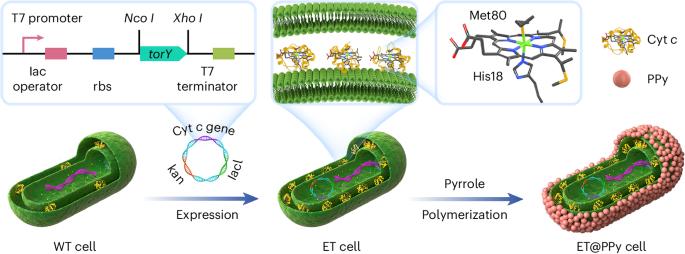Sustainable power generation from sewage with engineered microorganisms as electrocatalysts
IF 25.7
1区 环境科学与生态学
Q1 ENVIRONMENTAL SCIENCES
引用次数: 0
Abstract
Microbial fuel cells (MFCs) are an emerging technology that could degrade contaminants and produce electricity simultaneously with the assistance of microorganisms. However, key challenges remain for their practical implementation, including the lack of efficient and cost-effective catalysts at the cathode. Here we take advantage of a sustainable cathode biocatalyst to construct a high-performance MFC that allows fast treatment of sewage and competitive power output. Our catalyst design is built on the Escherichia coli cell, which, upon coupled gene and nano engineering, shows excellent oxygen reduction reaction activity (current density of 3.32 mA cm−2 and onset potential of 0.63 V versus the reversible hydrogen electrode) and accelerates the depollution of organic matter in sewage sludge. Remarkably, glucose consumption reaches a level as high as 19.4 mM in 100 h with a maximum power density of 334 μW cm−2. Combined characterizations and theoretical calculations reveal that the enabling chemistry is the unique configuration of the iron centre of intermembranous cytochrome c in cells. Our study not only opens a new path for the rational design of electrocatalysts but also suggests the feasibility of addressing environmental issues using MFCs. This study presents a microorganism electrocatalyst for the cathode of a microbial fuel cell that allows simultaneous electricity generation and treatment of sewage.

利用工程微生物作为电催化剂从污水中进行可持续发电
微生物燃料电池(MFCs)是一项新兴技术,可在微生物的帮助下降解污染物并同时发电。然而,其实际应用仍面临关键挑战,包括阴极缺乏高效且成本效益高的催化剂。在这里,我们利用一种可持续的阴极生物催化剂,构建了一种高性能的 MFC,既能快速处理污水,又能输出具有竞争力的电能。我们的催化剂设计建立在大肠杆菌细胞的基础上,通过基因和纳米工程耦合,大肠杆菌细胞显示出卓越的氧还原反应活性(相对于可逆氢电极,电流密度为 3.32 mA cm-2,起始电位为 0.63 V),并加速了污水污泥中有机物的去污。值得注意的是,在 100 小时内,葡萄糖消耗量高达 19.4 mM,最大功率密度为 334 μW cm-2。综合表征和理论计算显示,促成这种化学反应的是细胞中膜间细胞色素 c 铁中心的独特构型。我们的研究不仅为合理设计电催化剂开辟了一条新的道路,还表明了利用 MFCs 解决环境问题的可行性。本研究提出了一种用于微生物燃料电池阴极的微生物电催化剂,可同时发电和处理污水。
本文章由计算机程序翻译,如有差异,请以英文原文为准。
求助全文
约1分钟内获得全文
求助全文
来源期刊

Nature Sustainability
Energy-Renewable Energy, Sustainability and the Environment
CiteScore
41.90
自引率
1.10%
发文量
159
期刊介绍:
Nature Sustainability aims to facilitate cross-disciplinary dialogues and bring together research fields that contribute to understanding how we organize our lives in a finite world and the impacts of our actions.
Nature Sustainability will not only publish fundamental research but also significant investigations into policies and solutions for ensuring human well-being now and in the future.Its ultimate goal is to address the greatest challenges of our time.
 求助内容:
求助内容: 应助结果提醒方式:
应助结果提醒方式:


